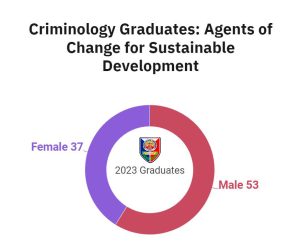The academic year 2023-2024 marks a momentous occasion for the criminology department as we proudly present 90 graduates, each of whom is set to contribute to the criminal justice system and uphold the principles of law and order. These graduates stand as beacons of hope in the ongoing fight for justice and equality. However, their significance extends beyond their chosen field—they are also essential players in the global mission to achieve sustainable development, particularly the United Nations’ 2030 Agenda for Sustainable Development, which lays out 17 goals aimed at promoting peace, prosperity, and environmental stewardship.
This article celebrates the accomplishments of these criminology graduates while exploring how their education and future careers align with the SDGs. By fostering a deeper understanding of justice, promoting gender equality, and contributing to peaceful and inclusive societies, these young professionals are well-positioned to make a meaningful difference both locally and globally. The Criminology Graduates of S.Y. 2023-2024 have undergone rigorous training, studying the complexities of crime, law enforcement, forensics, and criminal psychology. Throughout their academic journey, they have been equipped with the tools to analyze crime patterns, understand criminal behavior, and develop preventive measures that align with ethical and moral standards.
The importance of their work cannot be overstated. Crime, in all its forms, affects the stability of communities, undermines development efforts, and exacerbates inequality. These graduates are not just law enforcers or analysts; they are agents of change, capable of shaping policies and practices that will reduce crime and promote fairness in society. Their roles, however, go beyond merely enforcing laws. As future leaders in criminology, they will be tasked with solving real-world issues that connect to larger global challenges, including poverty, inequality, and environmental degradation—all of which have a direct or indirect impact on crime rates and the criminal justice system.
The United Nations’ 2030 Agenda for Sustainable Development highlights 17 goals that aim to eradicate poverty, reduce inequality, and address environmental challenges. Among these, several SDGs directly relate to the work that criminology graduates will engage in, namely: SDG 4 (Quality Education), SDG 5 (Gender Equality), SDG 10 (Reduced Inequalities), and SDG 16 (Peace, Justice, and Strong Institutions).
Quality education plays a foundational role in shaping the futures of criminology graduates. Their comprehensive education, which encompasses both theoretical knowledge and practical skills, aligns with SDG 4, which aims to ensure inclusive and equitable quality education and promote lifelong learning opportunities for all. Through their studies, these graduates have not only mastered criminological concepts but have also developed critical thinking, problem-solving, and ethical decision-making skills essential for advancing peace and justice in society. The education they receive empowers them to contribute meaningfully to the justice system while also advocating for education that is accessible to all, as it is a powerful tool in preventing crime and fostering peaceful communities. Their commitment to lifelong learning and their role as informed citizens will help drive sustainable development by promoting knowledge-sharing and equitable access to educational resources.
Criminology graduates of 2023-2024 have a critical role in promoting gender equality, both in their personal lives and professional endeavors. As they enter various fields such as law enforcement, policymaking, and community outreach, they will be at the forefront of addressing gender-based violence, a pervasive issue across the world. This aligns with SDG 5, which seeks to eliminate all forms of violence against women and girls, including trafficking, sexual exploitation, and other forms of abuse.
Criminologists are uniquely positioned to study the root causes of gender-based violence and develop strategies to prevent it. By analyzing patterns of crime and contributing to research on gender disparities, they can help inform policies that protect vulnerable populations. As future officers of the law, they will be instrumental in ensuring that justice is served and that gender-related crimes are taken seriously and prosecuted accordingly. The integration of gender perspectives in criminology is more important now than ever. Addressing gender-related crimes not only fulfills a societal need but also contributes to building a more equitable world. These graduates will be on the frontlines of advocating for equal treatment, providing a voice for the marginalized, and working toward dismantling systemic barriers that perpetuate gender-based injustices.
Inequality, in its various forms, has a profound effect on crime. Poverty, marginalization, and lack of access to resources often push individuals toward criminal activities. Criminology graduates can be pivotal in addressing these root causes by developing interventions that go beyond mere punishment. Instead, they can help implement rehabilitative programs that focus on reintegration into society, thus reducing recidivism rates and providing former offenders with opportunities to lead productive lives.
The goal of reducing inequality is also intrinsically linked to the work of these criminologists. By analyzing disparities within the justice system—whether racial, socioeconomic, or gender-based—they can contribute to policy changes that ensure fair treatment for all individuals, regardless of their background. Their work will involve identifying and addressing biases within the system, ensuring that everyone has access to justice and that marginalized communities are not disproportionately affected by inequitable policies. Criminology’s emphasis on understanding the causes of crime and its impact on different social groups allows these graduates to play an active role in advocating for equal rights and treatment. This aligns with SDG 10, which calls for reducing inequalities in income, gender, and other social determinants. By fostering inclusive practices and working toward fair and equitable systems, criminologists can help dismantle structures that perpetuate inequality.
Perhaps the most directly relevant of all the SDGs to criminology is SDG 16, which aims to promote peaceful and inclusive societies, provide access to justice for all, and build effective, accountable institutions. The work of criminologists is fundamental to achieving this goal. They are not only tasked with solving crimes but also with fostering trust between communities and the justice system. Criminology graduates of 2023-2024 will be vital in reforming institutions to make them more transparent and responsive to the needs of the public. Whether they work in law enforcement, correctional facilities, or within community organizations, their influence will help shape a more just society. The knowledge and skills they have acquired allow them to critically assess current practices, identify inefficiencies, and propose solutions that will create a fairer system for all.
Moreover, the principles of restorative justice, which many of these graduates have studied, will play a critical role in promoting peace and reconciliation. By advocating for rehabilitation over retribution and focusing on healing for both victims and offenders, criminologists contribute to the long-term goal of reducing violence and fostering peaceful coexistence.
The future careers of these criminology graduates will also involve collaboration with other sectors to ensure that peace and justice are not isolated from broader development goals. For instance, they will work alongside education, health, and economic development professionals to create comprehensive approaches to preventing crime and building stronger communities. The 90 criminology graduates of the school year 2023-2024 represent more than just a new cohort of professionals entering the workforce. They embody the hope of a more just and peaceful world, where crime is not only addressed but prevented through sustainable practices. Their contributions will be essential in achieving the United Nations’ Sustainable Development Goals, particularly those related to gender equality, reducing inequalities, and promoting peace and justice.
As they embark on their respective careers, these graduates will find themselves at the intersection of criminology and sustainable development. Whether they are investigating crimes, shaping policies, or working directly with communities, their efforts will resonate with the global push for a more equitable and sustainable future. These young professionals are not just guardians of the law—they are stewards of the SDGs, working to ensure that justice, equality, and peace become the foundation of a better tomorrow.



